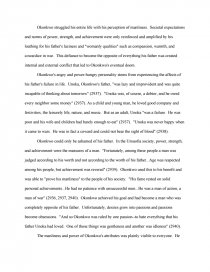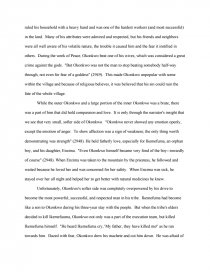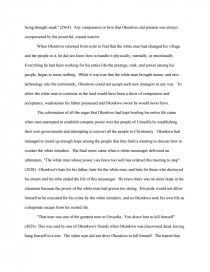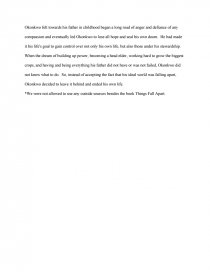Things Fall Apart
Essay by review • December 15, 2010 • Essay • 1,215 Words (5 Pages) • 1,733 Views
Okonkwo struggled his entire life with his perception of manliness. Societal expectations and norms of power, strength, and achievement were only reinforced and amplified by his loathing for his father's laziness and "womanly qualities" such as compassion, warmth, and cowardice in war. This defiance to become the opposite of everything his father was created internal and external conflict that led to Okonkwo's eventual doom.
Okonkwo's angry and power-hungry personality stems from experiencing the affects of his father's failure in life. Unoka, Okonkwo's father, "was lazy and improvident and was quite incapable of thinking about tomorrow" (2937). "Unoka was, of course, a debtor, and he owed every neighbor some money" (2937). As a child and young man, he loved good company and festivities, the leisurely life, nature, and music. But as an adult, Unoka "was a failure. He was poor and his wife and children had barely enough to eat" (2937). "Unoka was never happy when it came to wars. He was in fact a coward and could not bear the sight of blood" (2938).
Okonkwo could only be ashamed of his father. In the Umuofia society, power, strength, and achievement were the measures of a man. "Fortunately, among these people a man was judged according to his worth and not according to the worth of his father...Age was respected among his people, but achievement was revered" (2939). Okonkwo used this to his benefit and was able to "prove his manliness" to the people of his society. "His fame rested on solid personal achievements...He had no patience with unsuccessful men...He was a man of action, a man of war" (2936, 2937, 2940). Okonkwo achieved his goal and had become a man who was completely opposite of his father. Unfortunately, desires grow into passions and passions become obsessions. "And so Okonkwo was ruled by one passion--to hate everything that his father Unoka had loved. One of those things was gentleness and another was idleness" (2940).
The manliness and power of Okonkwo's attributes was plainly visible to everyone. He ruled his household with a heavy hand and was one of the hardest workers (and most successful) in the land. Many of his attributes were admired and respected, but his friends and neighbors were all well aware of his volatile nature, the trouble it caused him and the fear it instilled in others. During the week of Peace, Okonkwo beat one of his wives, which was considered a great crime against the gods. "But Okonkwo was not the man to stop beating somebody half-way through, not even for fear of a goddess" (2949). This made Okonkwo unpopular with some within the village and because of religious believes, it was believed that his sin could ruin the fate of the whole village.
While the outer Okonkwo and a large portion of the inner Okonkwo was a brute, there was a part of him that did hold compassion and love. It is only through the narrator's insight that we see that very small, softer side of Okonkwo. "Okonkwo never showed any emotion openly, except the emotion of anger. To show affection was a sign of weakness; the only thing worth demonstrating was strength" (2948). He held fatherly love, especially for Ikemefuma, an orphan boy, and his daughter, Enzima. "Even Okonkwo himself became very fond of the boy--inwardly of course" (2948). When Enzima was taken to the mountain by the priestess, he followed and waited because he loved her and was concerned for her safety. When Enzima was sick, he stayed over her all night and helped her to get better with natural medicines he knew.
Unfortunately, Okonkwo's softer side was completely overpowered by his drive to become the most powerful, successful, and respected man in his tribe. Ikemefuma had become like a son to Okonkwo during his three-year stay with the people. But when the tribe's elders decided to kill Ikemefuuma, Okonkwo not only was a part of the execution team, but killed Ikemefuma himself. "He heard Ikemefuma cry, 'My father, they have killed me!' as he ran towards him. Dazed with fear, Okonkwo drew
...
...



